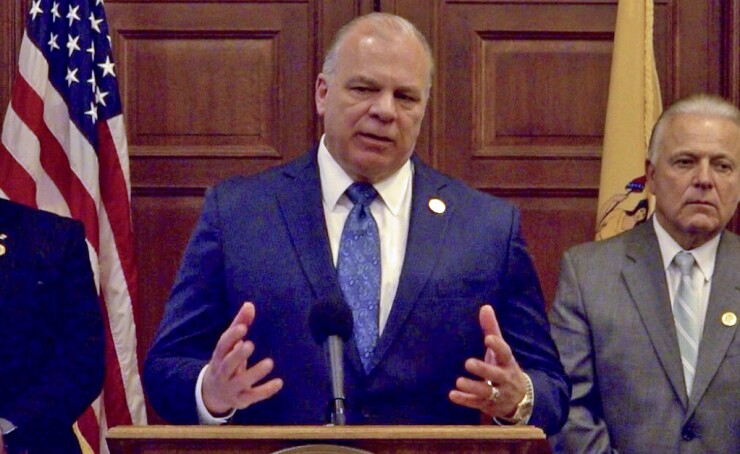A New Jersey proposal seeking authority to issue billions of general obligation bonds without voter approval easily cleared one legislative hurdle in the Democrat-led General Assembly late last week and now faces far tougher barriers in the state Senate, where the Dems hold a smaller majority, but are more fiscally conservative.
The Assembly in a 51-28 vote along party lines passed the “

The proposed measure would grant special borrowing powers enabling bonding for the purposes of sustaining state operating costs that are normally constitutionally forbidden. The bill notes language in the
The bill has not yet been introduced in the State Senate where the Democrats hold a 25-15 majority. Senate President Steve Sweeney, D-Gloucester, voiced concerns about aspects of the borrowing plan prior to the Assembly vote, such as the 35-year maturity date for the GO bonds and the potential for future tax increases in order to pay off the debt.
Sweeney spokesman Richard McGrath declined to comment Friday after the Assembly approval and said the bill was not scheduled yet for any Senate action.
Seton Hall University political science professor Matt Hale said the state Senate is comprised of many more fiscally conservative Democrats from South Jersey, like Sweeney, who are more reluctant to increase debt. Hale said Sweeney will likely delay deciding whether to pursue a vote until it is determined whether revenue numbers exceed dire expectations laid out last month by State Treasurer Elizabeth Maher Muoio of a
“The Assembly Democrats are much more comfortable with taxes and borrowing than the Senate,” Hale said. “I think Sweeney wants to hold off on any action until he has as much information as possible.”
Regina Egea, president of the conservative-leaning Garden State Initiative, said she objects to the borrowing plan because of language in the bill that implement hikes to sales and property taxes if revenues are insufficient to meet debt payments. The possible property tax surcharge that could result from the bond plan would hamper efforts to grow New Jersey’s economy, she claims.
“A statewide property tax writes a blank check to the Governor to leverage our private property as collateral to finance government’s day-to-day operating expenses,” Egea said. “Total property value in New Jersey is over $1 trillion and already bears the highest property tax levy in the U.S. This is a main contributor to our uncompetitive cost of living and laggard economic performance pre-COVID.”
Murphy defended the potential tax increases during his June 5 COVID-19 press briefing and argued this is common practice for any bonding bill. He stressed the borrowing is necessary to avoid massive public worker layoffs.
“This is not only has nothing to do with raising property taxes, this is the one weapon we've got at our disposal to prevent that,” Murphy said. “It's boilerplate language that's been in every bond the state has done for decades and decades and decades.”
New Jersey’s GO bond ratings are second lowest of all U.S. states ahead of only Illinois. Fitch Ratings





